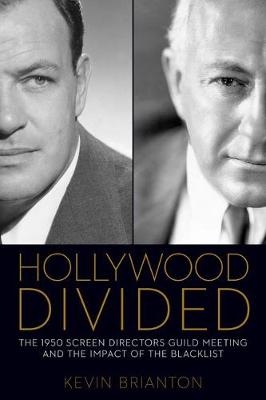
Hollywood Divided
The 1950 Screen Directors Guild Meeting and the Impact of the Blacklist
Seiten
2016
The University Press of Kentucky (Verlag)
978-0-8131-6892-0 (ISBN)
The University Press of Kentucky (Verlag)
978-0-8131-6892-0 (ISBN)
- Keine Verlagsinformationen verfügbar
- Artikel merken
On October 22, 1950, the Screen Directors Guild (SDG) gathered for a meeting at the opulent Beverly Hills Hotel. Among the group's leaders were some of the most powerful men in Hollywood -- John Ford, Cecil B. DeMille, Joseph L. Mankiewicz, John Huston, Frank Capra, William Wyler, and Rouben Mamoulian -- and the issue on the table was nothing less than a vote to dismiss Mankiewicz as the guild's president after he opposed an anticommunist loyalty oath that could have expanded the blacklist. The dramatic events of that evening have become mythic, and the legend has overshadowed the more complex realities of this crucial moment in Hollywood history.
In Hollywood Divided, Kevin Brianton explores the myths associated with the famous meeting and the real events that they often obscure. He analyzes the lead-up to that fateful summit, examining the pressure exerted by the House Un-American Activities Committee. Brianton reveals the internal politics of the SDG, its initial hostile response to the HUAC investigations, the conservative reprisal, and the influence of the oath on the guild and the film industry as a whole. Hollywood Divided also assesses the impact of the historical coverage of the meeting on the reputation of the three key players in the drama.
Brianton's study is a provocative and revealing revisionist history of the SDG's 1950 meeting and its lasting repercussions on the film industry as well as the careers of those who participated. Hollywood Divided illuminates how both the press's and the public's penchant for the "exciting story" have perpetuated fabrications and inaccurate representations of a turning point for the film industry.
In Hollywood Divided, Kevin Brianton explores the myths associated with the famous meeting and the real events that they often obscure. He analyzes the lead-up to that fateful summit, examining the pressure exerted by the House Un-American Activities Committee. Brianton reveals the internal politics of the SDG, its initial hostile response to the HUAC investigations, the conservative reprisal, and the influence of the oath on the guild and the film industry as a whole. Hollywood Divided also assesses the impact of the historical coverage of the meeting on the reputation of the three key players in the drama.
Brianton's study is a provocative and revealing revisionist history of the SDG's 1950 meeting and its lasting repercussions on the film industry as well as the careers of those who participated. Hollywood Divided illuminates how both the press's and the public's penchant for the "exciting story" have perpetuated fabrications and inaccurate representations of a turning point for the film industry.
Kevin Brianton is a lecturer in strategic communication at La Trobe University, USA.
| Erscheinungsdatum | 03.11.2016 |
|---|---|
| Reihe/Serie | Screen Classics |
| Zusatzinfo | 13 b/w photos |
| Verlagsort | Lexington |
| Sprache | englisch |
| Maße | 152 x 229 mm |
| Themenwelt | Kunst / Musik / Theater ► Film / TV |
| Geisteswissenschaften ► Geschichte ► Regional- / Ländergeschichte | |
| Sozialwissenschaften ► Kommunikation / Medien | |
| Sozialwissenschaften ► Politik / Verwaltung ► Politische Systeme | |
| Sozialwissenschaften ► Soziologie | |
| Wirtschaft | |
| ISBN-10 | 0-8131-6892-9 / 0813168929 |
| ISBN-13 | 978-0-8131-6892-0 / 9780813168920 |
| Zustand | Neuware |
| Haben Sie eine Frage zum Produkt? |
Mehr entdecken
aus dem Bereich
aus dem Bereich


